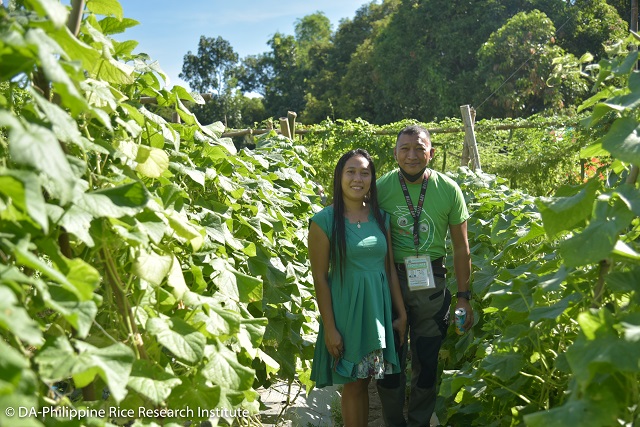
When they lost their jobs because of the pandemic, licensed massage therapist Aila Grospe and her business consultant-husband Pierangelo Alejo were faced with the challenge to look for new sources of income.
Remembering her family’s 1.3-ha farm, which they did not till for 15 years since her father passed away, Aila convinced her husband to try their hands in farming. With their two children, they decided to leave Alabang, Muntinlupa City and start anew in Lupao, Nueva Ecija.
New community
“The thought of personally cultivating our farm was daunting at first because I was not sure how we would do it. Thankfully, there were people who helped us start. With hired laborers, we were able to clean and revive the farm in one week,” Aila recounted.
Her farmer-uncle provided them with seeds to try rice farming. He also introduced them to the Lupao Vegetable Growers’ Association (LVGA) and urged them to join it.
“Joining LVGA made starting this business easier for us. We were provided with the machines and implements that we need in cultivating the land,” she said.
The couple then became farmer-cooperators of “Sa Palay at Gulay – May Ani, Hanapbuhay, Oportunidad, at Nutrisyon (PAG-AHON-Phase II)” project of DA-PhilRice, in collaboration with the local government of Lupao, LVGA, and East-West Seed Company.
“We are thankful that through PAG-AHON, DA-PhilRice taught us the PalayCheck System, which we applied in the 1500m2 we planted with rice. We learned to use the right element in the right amount at the right time when applying fertilizers,” she detailed.
Through the project, they were also able to acquire ampalaya and cucumber seeds from East-West Seed planted in a 2,000m2 part of their farm.
“While rearing the vegetables, we learned how to grow plants organically. The pests are challenging and fertilizer application is not easy but we are continuously learning,” she said.
Their efforts to learn paid off a few months after they started. Their farm was Good Agricultural Practices (GAP)-certified in December 2021, which makes DA guide them in organic vegetable production.
New ideas, innovations
The couple’s ingenuity surfaced when they started harvesting their first produce. Aila made her own recipe of cucumber juice and pickles.
“Since we are planting chili pepper this season, we also thought of making dinagopa, my husband’s recipe of processed chili pepper with bagoong. We have been selling this product back in Alabang,” she related.
The PAG-AHON project helped them gain around P24,000 from their first produce. She related that it was especially easy for them to sell their vegetables that contributed largely to their income.
“We already have buyers, who are partners of LVGA thru PAG-AHON, waiting for our harvests. And since we are GAP-certified, they buy our produce P5 higher for each kilogram,” the mom-agripreneur said.
New aspirations
Aila and Pierangelo thought that they can make more products out of their farm’s produce.
“I am thinking of making papaya jam and other products from our vegetable produce that we can sell. We are also thinking of producing more organic vegetables as we are now devoted to learning organic farming,” Aila shares their aspirations.
More than building their own business, the couple is also teaching other farmers.
“We are also now certified paratechnicians trained by East-West Seed and DA. We are thankful that we were given the chance to guide farmers and share with them what we learned,” she said.
For Aila, deciding to optimize her inherited farm is one of the most rewarding things she did in her life.
“I’m happy that in doing this, we have a source of income while we also have safe and healthy food everyday, and we can help other farmers too,” she said with enthusiasm.




